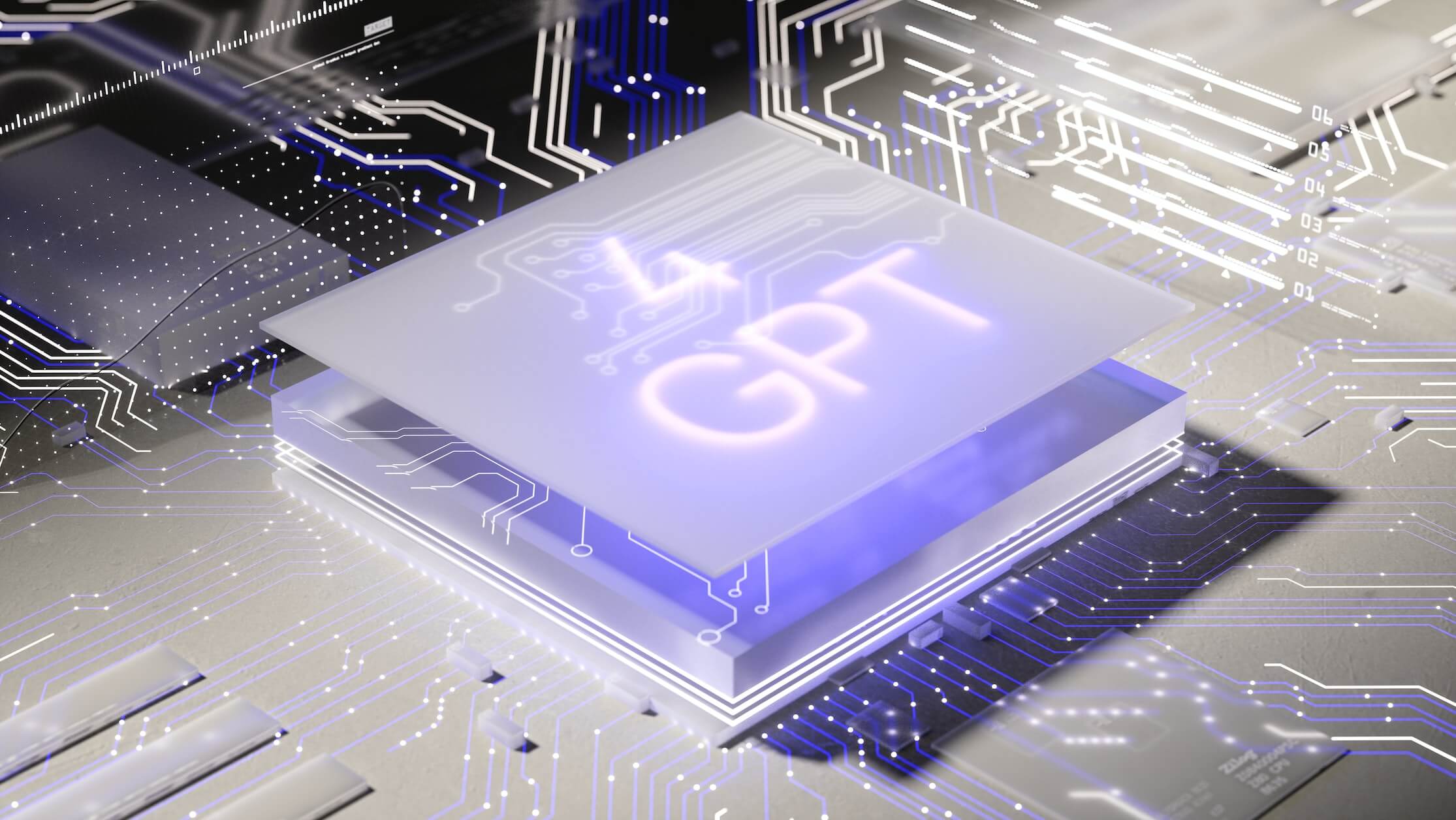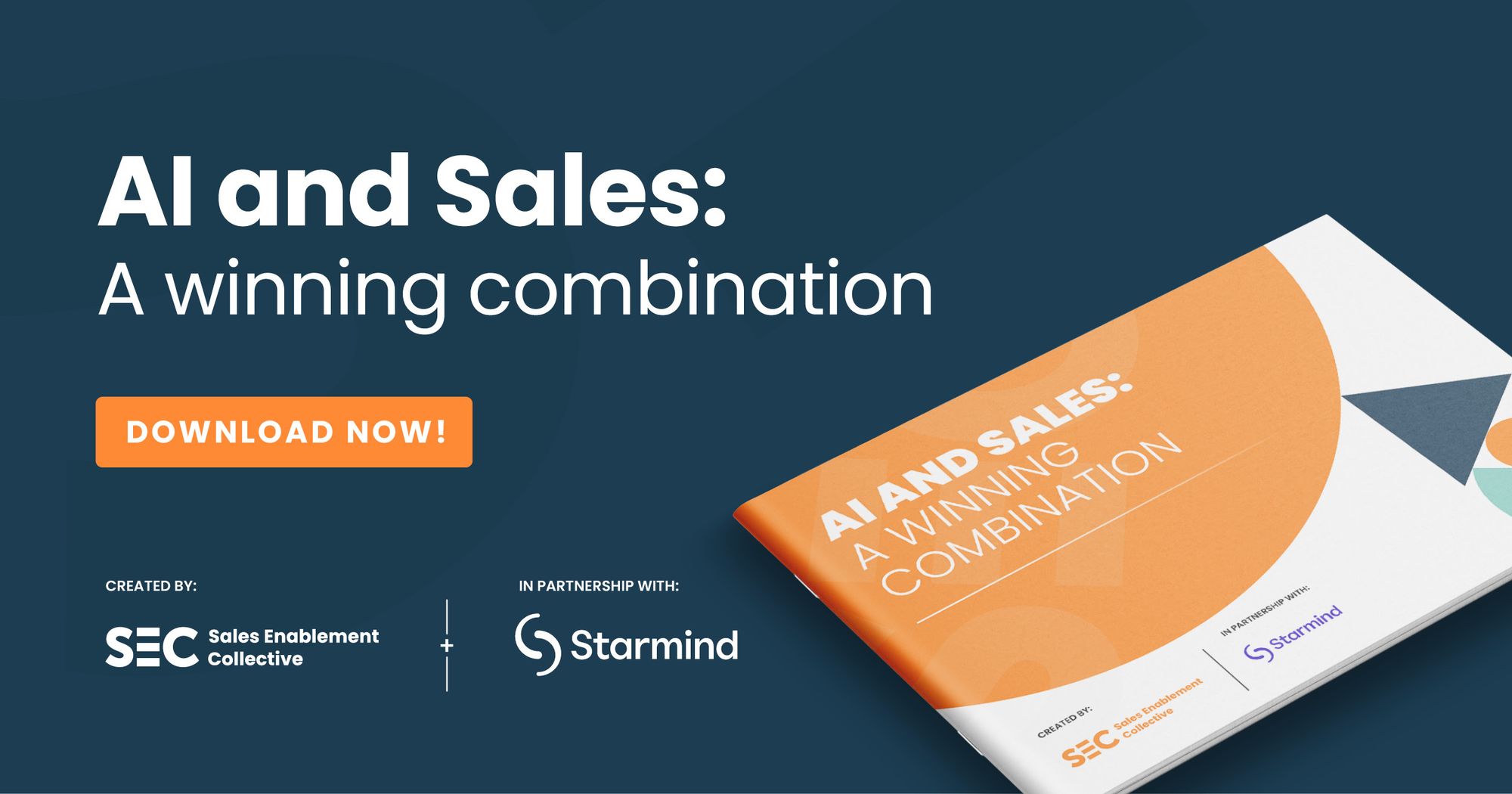This article was taken from Guillaume Huynh-Ba’s weekly LinkedIn newsletter.
As a sales leader, I've seen firsthand how technology transforms the art and science of selling. And in today's digital age, few technologies hold more disruptive potential than artificial intelligence.
From my vantage point guiding sales enablement strategy at Salesforce, I'm both fascinated and encouraged by AI's burgeoning impact.
So let's dive in and unpack how these tools are revolutionizing sales, one human interaction at a time.
The future of selling is here, are you ready?
- Dynamic demos: Leveraging generative AI for interactive product presentations
- Anticipate, address, achieve: Using generative AI for smarter objection handling in sales
- The dawn of AI-curated content: Personalizing sales collateral like never before
- AI-powered negotiation: The game changer in sales enablement
👇👇👇
Dynamic demos: Leveraging generative AI for interactive product presentations
In the vast universe of sales and pre-sales enablement, product demonstrations play a pivotal role. They bring concepts to life, showcase real-world application, and help potential clients visualize the solution at hand.
But in an era defined by swift technological advancements and varying customer demands, static demos can't quite cut it.
This is where Generative AI comes into play, bringing dynamism and adaptability to product demos like never before.
Let's explore the transformative impact of this technology on interactive product presentations.
Understanding generative AI in demos
At its core, Generative AI uses algorithms to produce content. For product demos, this means dynamically generating demonstrations based on various parameters – from audience preferences to specific questions raised during the presentation.
Applications in dynamic demos:
- Adaptive scenarios:
Generative AI can adjust the demo in real-time to showcase specific features or scenarios. For instance, if a client wonders how a software might function in a high-demand scenario, the AI can instantly simulate and showcase that.
- Audience-tailored demonstrations:
Before the demo, AI can analyze the client’s industry, business size, and unique challenges to curate a demonstration tailored to their context.
- Instant query addressal:
Upon receiving questions or concerns from the audience, the AI can immediately generate relevant content or simulations to address them, fostering a responsive and immersive experience.
- Integration of feedback:
Post-demo feedback can be integrated to refine future demonstrations, ensuring that the content remains relevant, informative, and aligned with audience needs.

Impacts on the sales process:
- Increased engagement:
Interactive demos, by nature, engage audiences more effectively. When clients see relevant, tailored content, their interest peaks.
- Streamlined decision making:
By addressing queries in real-time and providing a contextual experience, potential clients can make quicker and more informed decisions.
- Enhanced credibility:
Dynamic demos underscore a company’s commitment to innovation and customer-centricity, bolstering its credibility and reputation.
- Efficiency gains:
Sales reps can focus on relationship-building and strategic discussions, as the AI handles the intricacies of the demo.
The human-AI synergy:
It's crucial to understand that Generative AI doesn't replace the human touch in product demos. Instead, it augments it.
The spontaneity, intuition, and personal connection established by sales professionals remain irreplaceable. AI serves as a tool, empowering them to deliver more impactful, relevant, and captivating demonstrations.
Concluding thoughts:
Generative AI is reshaping the landscape of product demos, introducing a level of dynamism previously unattainable. As businesses embrace this technology, they're not only enhancing the quality of their presentations but also strengthening client relationships.
In a competitive market, the fusion of human expertise and AI-driven dynamism can make all the difference, turning potential interest into concrete investment.

Anticipate, address, achieve: Using generative AI for smarter objection handling in sales
In the intense world of sales, objection handling is arguably one of the most crucial skills in a professional’s arsenal. It's the bridge between a potential loss and a sealed deal.
However, traditional objection handling often relies on an individual's experience, intuition, and ability to think on their feet.
Enter Generative AI.
This revolutionary technology promises not just to support but to transform the objection-handling process. Let's explore the how and the why:
Objections: A glimpse into the past and present
Historically, sales teams prepared for objections through role-playing, studying scripts, and learning from experience.
But despite their best efforts, the unpredictability of human nature meant that unexpected objections always lurked around the corner.
Today, Generative AI offers a smarter approach, marrying data-driven insights with human intuition.
How generative AI enhances objection handling
- Proactive anticipation:
By analyzing vast datasets from previous sales encounters, market feedback, and competitor intel, AI can predict objections a sales rep is likely to face, depending on the prospect and context.
- Real-time response generation:
During live interactions, AI can provide instant, contextually relevant counters to objections raised, drawing from a vast repertoire of successful past responses.
- Learning and refinement:
Each objection and its outcome serve as a learning opportunity. AI systems continually refine their suggestions based on what works and what doesn’t, ensuring improved performance over time.
- Personalized objection handling:
Going beyond generic responses, AI can tailor responses to the specific concerns and priorities of a prospect. It considers factors like the client's industry, company size, and past interactions.

The ripple effects on sales
- Boosted confidence:
Equipped with AI insights, sales reps can approach conversations with enhanced confidence, knowing they're prepared for a wide array of objections.
- Time efficiency:
Instead of delving into lengthy, unproductive debates, reps can swiftly address objections, focusing the conversation on solution-oriented discussions.
- Higher conversion rates:
Effective objection handling directly correlates with better conversion rates. AI-backed responses can ensure that objections become stepping stones, not stumbling blocks.
- Consistent performance:
With AI assistance, even less experienced reps can handle objections at par with seasoned professionals, ensuring team-wide consistency.
A glimpse into the future: Can AI replace sales reps?
While Generative AI’s capabilities in objection handling are impressive, sales remain an intrinsically human endeavor. Empathy, rapport building, and genuine connection—these aren't elements AI can replicate.
Instead, the technology should be viewed as a tool that augments human capabilities, ensuring that reps are better equipped to handle challenges.
Concluding thoughts
As Generative AI makes its mark in the sales realm, its potential in enhancing objection handling is undeniable.
By marrying data-driven AI insights with human intuition and interpersonal skills, sales teams can navigate objections with unparalleled finesse.
The future of sales is not just about human or machine; it's about the synergy of both working in tandem to achieve sales excellence.

The dawn of AI-curated content: Personalizing sales collateral like never before
In the realm of sales and pre-sales enablement, content has always been king. Pitch decks, brochures, whitepapers, and case studies – these are the tangible narratives that bridge the gap between potential clients and successful deals.
However, in an era teeming with information and fierce competition, personalization has become the queen on this chessboard. The traditional, one-size-fits-all approach to content is becoming a relic of the past.
Enter Generative AI – the game-changer in crafting personalized, relevant, and compelling sales collateral.
A glimpse into traditional content creation
Historically, sales content has followed a template. Teams would create a set of standard materials, adjusting minor details for different clients or industries.
This approach, though time-efficient, often lacked the personal touch that truly resonates with potential clients.
How generative AI is reshaping this landscape
- Deep personalization:
By analyzing a potential client's digital footprint, past interactions, and industry trends, Generative AI can craft content that speaks directly to their specific needs, challenges, and aspirations.
- Real-time adjustments:
During a sales meeting, AI systems can dynamically adjust content based on the conversation flow. For example, if a client shows interest in a particular feature, the AI can emphasize related information in subsequent slides or documents.
- Visual enhancements:
Beyond text, Generative AI can suggest or generate visuals, infographics, or animations that align with a client's preferences, enhancing engagement and understanding.
- Iterative improvements:
Post-meeting feedback, engagement metrics, and conversion rates feed into the AI system, refining and optimizing future content pieces.

Business impacts and advantages
- Increased conversion rates:
Tailored content resonates better, leading to higher engagement and better conversion rates.
- Time and cost efficiency:
Instead of manually adjusting content for each client or lead, sales teams can rely on AI, allowing them to focus on relationship-building and other high-value activities.
- Consistent brand messaging:
While personalization is key, maintaining a consistent brand voice and message is vital. Generative AI ensures that all content aligns with the brand's core values and messaging guidelines.
- Enhanced client relationships:
When clients feel that content is crafted specifically for them, it fosters trust and strengthens the relationship, setting the stage for long-term collaboration.
The human touch in AI-generated content
It's essential to strike a balance. While Generative AI offers unparalleled personalization capabilities, the human element in understanding client emotions, reading between the lines, and building genuine relationships remains irreplaceable.
AI-generated content should be viewed as a powerful tool in a salesperson's arsenal, not a replacement for human connection.
Concluding thoughts
The future of sales collateral is undeniably intertwined with the capabilities of Generative AI.
By embracing this synergy of technology and human expertise, businesses can craft narratives that not only inform but also resonate deeply, turning potential interest into definitive action.
In the evolving landscape of sales, it's not just about having a story to tell, but about telling that story right. With Generative AI, every tale can be a masterpiece.

AI-powered negotiation: The game changer in sales enablement
In the world of sales, negotiation is a crucial skill that often determines the outcome of a deal.
Negotiating effectively requires not only a deep understanding of the customer's needs but also a strategic approach to reach a mutually beneficial agreement.
As we move into the age of AI, sales teams can leverage AI-powered tools to enhance their negotiation skills and achieve better outcomes. Let's explore how AI can aid the negotiation process and the role it can play in sales enablement.
Understanding the negotiation landscape
AI can help sales representatives understand the negotiation landscape by analyzing publicly available information about a potential client.
This can include studying news articles, press releases, social media posts, and any other publicly available documents that shed light on the client's business environment, preferences, and priorities.
By having a better understanding of what drives the client, sales representatives can tailor their approach and negotiation strategy to align with the client's objectives.

Preparation and planning
Preparation is key to successful negotiation, and AI can assist in this process. Sales representatives can use AI-powered tools to simulate negotiation scenarios, testing different strategies and approaches to see how they play out.
These simulations can help sales representatives anticipate potential objections, questions, or concerns from the client and prepare responses in advance.
This level of preparation not only instills confidence in the sales representative but also ensures that they are well-equipped to handle the dynamics of the negotiation.
Enhancing communication skills
AI-powered virtual coaches can help sales representatives improve their communication skills, which are vital for effective negotiation.
These virtual coaches can analyze the sales representative's verbal and non-verbal cues during a simulated negotiation and provide feedback on areas for improvement.
This includes aspects such as tone of voice, body language, and choice of words. By practicing and refining their communication skills, sales representatives can become more persuasive and effective negotiators.
Identifying mutual value
One of the keys to successful negotiation is finding areas of mutual value that benefit both parties.
AI can assist sales representatives in identifying potential value drivers for the client based on the information gathered during the preparation phase.
By understanding what is important to the client, sales representatives can craft proposals that resonate with the client's priorities, making it easier to reach an agreement that satisfies both parties.
Real-time assistance
During the negotiation itself, AI-powered tools can provide real-time assistance to sales representatives. These tools can analyze the conversation as it unfolds and provide suggestions or insights to the sales representative through a discreet earpiece or text interface.
This can include reminders of key points to emphasize, responses to common objections, or suggestions on when to make concessions.
This real-time support can help sales representatives stay focused and agile during the negotiation, increasing their chances of success.
Concluding thoughts
In conclusion, AI-powered tools can play a significant role in enhancing the negotiation skills of sales representatives.
By assisting in the preparation, planning, and execution of negotiations, AI can help sales representatives achieve better outcomes and drive sales success.
In the age of AI, sales enablement professionals have a powerful tool at their disposal to empower sales teams to become more effective and successful negotiators.

Join 7,000+ of your sales enablement peers in our Slack community! Ask questions, idea-share, and network today.



